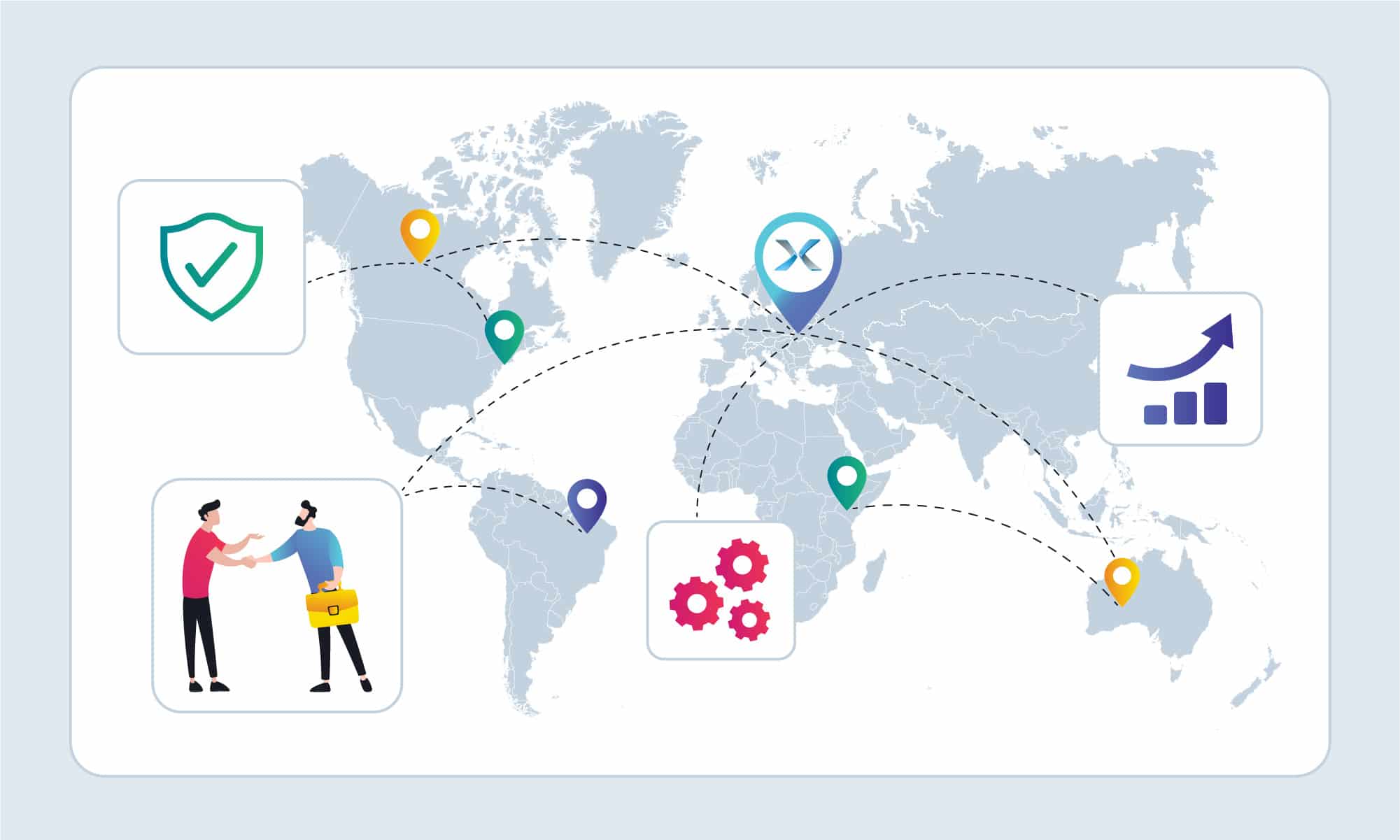Revolutionizing financial workflows, Robotic Process Automation (RPA) in Finance and Accounting brings efficiency and accuracy. In this article, we'll explore its benefits and pivotal use cases reshaping the financial landscape. We'll discover how Robotic Process Automation in Finance and Accounting boosts accuracy, slashes costs, and transforms tasks like invoice processing and financial reporting, enhancing overall operational efficiency.
We will cover such questions as:
- What is robotic process automation in finance and accounting?
- Advantages of RPA in finance and accounting
- RPA use cases in financial and accounting services
- The Role of RPA for Finance and Accounting
- Key Principles of RPA in Finance and Accounting
- Main Benefits of RPA in Finance and Accounting
- Staff Deficiency
- Customer Service
- Regulatory Compliance
- Data Control
- Main Benefits of RPA in Finance and Accounting
- Time efficiency
- Saved costs
- Integration with existing systems
- Fewer mistakes
- Scalability
- 360-degree visibility
- The Best Examples of RPA Use in Finance and Accounting
- Financial reporting
- Invoice processing
- Expense reporting
- Credit card processing
- Financial planning and forecasting
- Taxes
- Payroll management
- Potential roadblocks to implementing RPA in automation
- Consider Inoxoft Your Trusted Partner
The Role of RPA for Finance and Accounting
RPA is a relatively new technology that impacts Fintech services. Known as smart RPA deployment or “intelligent automation,” “RPA” is an umbrella term for advanced software technology (software robots) that can be programmed to perform a series of tasks that previously required human intervention. Other robotic solutions incorporate machine learning and include cognitive computing and artificial intelligence.
The global robotic process automation market is set to grow from $13.86 billion in 2023 to $50.50 billion in 2030, with an annual growth rate of 20.3%. At the same time, in a third of companies (35%) implementing RPA, the finance & accounting department handles it.
There are many tasks within accounting and finance that you can take part out of human hands for more efficient work. Robotic process automation is sometimes referred to as “digital FTEs” or “human proxies” as it can be used to handle routine, rule-based tasks, and basic operations and interact with systems as a human would.
Practical process automation applications include risk assessments, security checks, data analysis and reporting, compliance processes as well as most other repetitive administrative activities. This gives financial institutions more time and workforce to perform their core responsibilities.
Key Principles of RPA in Finance and Accounting
RPA is not one particular tool or product. If you decide to implement RPA, you need to evaluate multiple RPA solutions in the marketplace to identify which best fits best to your company.
RPA software runs separately from applications and underlying systems and can be implemented relatively easily. However, it requires human interaction for quality control and maintenance. For instance, if you make any updates to your corporate CRM system, RPA software needs to be modified as well to ensure it is performing accurately.
RPA doesn’t require the same level of engineering involvement as traditional automation does. RPA is faster, more affordable, and easier to program and maintain.
Due to its scalability, there is no limit to the number of processes that RPA can manage. Usually, the processes for automation are definable and rule-based, making reporting, accounts payable, clients feedback capture, and so on.
Main Benefits of RPA in Finance and Accounting
RPA enables your company to adjust to the changing business landscape and eventually succeed. Here are five compelling reasons why you should consider implementing robotics process automation in finance and accounting:
Staff Deficiency
Labor-intensive sectors can be particularly vulnerable to workforce shortages, disrupting operations and impacting productivity. RPA allows you to automate repetitive and rule-based accounting tasks, reducing your organization’s reliance on human labor for these routine activities. This not only ensures that essential financial processes continue efficiently but also frees up your human workforce for more strategic and value-added duties.
Customer Service
RPA speeds up accounting tasks like processing invoices and payments so you reduce errors and meet payment deadlines. This means you can avoid late fees, keeping your relationships with suppliers and clients positive. At the same time, you focus on more important tasks like planning and improving customer interactions, making the client experience even better.
Regulatory Compliance
Regulatory compliance is a critical concern for businesses, and its absence leads to legal issues, fines, and reputation damage. RPA robots follow predefined rules and procedures consistently. Using it, you ensure that accounting practices are implemented accurately, minimizing the risk of compliance errors or deviations. Audit trails document every step of the process, making it easier to track and verify compliance over time.
Data Control
Data governance in accounting tasks, like invoice processing, is crucial because it involves handling sensitive client information. However, ensuring effective data governance can be challenging, especially when accounting teams are working remotely. RPA automatically extracts relevant data from emails for invoice processing and follows strict rules and protocols. It minimizes the chances of data exposure or unauthorized access.
You can also integrate AI-powered tools with RPA to perform advanced tasks like data analysis, predictive modeling, and decision-making. Such implementation allows you to identify bottlenecks and areas for improvement, as well as modernize your operations and improve customer experiences.
Main Benefits of RPA in Finance and Accounting
Even though there may be some risks related to new technologies employment, there are even more pros of RPA in finance and accounting:
Time efficiency
RPA saves finance and accounting departments from 25K hours of work that can be avoided. The application of RPA in accounting is an effective way to boost operational efficiency and spend less time on daily tasks. Use these saved hours on brain-storming or other revenue-generating activities. For example, PwC reported that applying RPA can reduce the time spent on the taxing process from 200 to 20 hours.
Saved costs
Another benefit of robotic process automation in the financial industry is budget optimization. RPA solutions can save up to 40% in labor costs. RPA cuts labor expenses by 25-40%, making business processes more efficient. As it was mentioned above, RPA saves resources by handling repetitive tasks faster than humans.
Integration with existing systems
Unlike traditional automation in finance and accounting, RPA can smoothly interact with existing corporate systems (e.g. company’s ERP or CRM). They can manipulate data, set off responses and review reports, and carry out problems. Robots in accounting have the same level of security and access as a real person, but they can work without interruption.
Fewer mistakes
Accounting includes complex processes and impacts different companies’ departments. Minor human errors in each department can accumulate, leading to significant losses. RPA services for the accounting industry let companies automate manual accounting procedures to eliminate human errors from the equation.
Scalability
There is always a need to hire a new team member to help manage the workload in case transaction volume gets to a certain point. With RPA if workload increases, the bot’s output can scale as needed.
360-degree visibility
With all systems integrated, financial teams can get a complete, 360-degree view of all accounting processes. It helps to understand the logic behind all financial reports, allowing make smarter business decisions.
The Best Examples of RPA Use in Finance and Accounting
Most financial companies and institutions have to process hundreds of transactional records per day, dig across information systems, extract data, and complete data entry. Let’s talk about RPA use cases in finance and accounting to discover how robotic process automation streamlines the daily routine.
Financial reporting
To monitor financial performance has to be tracked on a daily basis. Manual reports are time-consuming and require good expertise. RPA makes the business processes more transparent and ensures financial forecasting accuracy by generating reports
- Income statement
- Variance analysis
- Balance sheets
- Financial close processes
- Management reports
Invoice processing
Сompanies of all industries, especially in Fintech, manage invoices daily. It is another complex and time-consuming process that RPA in finance can deal with most efficiently. It automatically processes invoices, stores it, automates the data input, and error reconciliation, and minimizes potential errors and the need for human intervention.
Expense reporting
Companies accumulate expenses from different business activities. Expense reporting is crucial for efficient bookkeeping and finance management. However, this process is tedious and costly when performed manually. You can automate expense reporting using RPA. Robust RPA bots can aggregate data into expense reports, attach receipts to corresponding entries, verify existing expense logs, and flag policy violations or data discrepancies. Automating this process using RPA can reduce errors, improve employee experience, and enhance adherence to company policies and legislation.
Credit card processing
With RPA in banking, the process of validation of the customer information and approving credit cards can be done within hours, instead of weeks as it used to be. RPA makes a decision to approve or disapprove the application by interacting with multiple systems simultaneously to validate the information: e.g. documents, background checks, credit history, and take
Financial planning and forecasting
Financial statements and data must be properly input to predict the future accurately. Robots collect, store data, and transform it for forecasting. By using historical data automation solutions can put together a complete picture of what you can expect the future to hold. With this information, you can create a financial forecast and then also benefit from conducting variance analysis seamlessly.
Taxes
RPA services for the accounting industry can automate the process of tax calculations and compliance by gathering data, preparing reports, creating tax bases, performing tax returns, and submitting these reports to tax authorities.
Payroll management
Among other RPA financial use cases is employee payroll management. Usually, this process is time-consuming as it includes such subtasks as data extraction and entry, timesheet validation, employee information verification, scheduling payments, and calculating pay-out. To avoid any inaccuracies or delays, RPA automates payroll management by extracting data from different sources and calculating payments with 100% accuracy.
Potential roadblocks to implementing RPA in automation
After discussing the benefits of RPA in accounting and finance, it would be fair to talk about potential roadblocks you may face during the process. Here are some key points to consider:
- Accuracy. RPA operates based on predefined rules, but humans remain in control, configuring rules and overseeing the robotic accounting processes. You should implement continuous monitoring and updating of RPA bots to ensure accuracy and compliance.
- Standardization. Rushing into RPA implementation without well-defined and up-to-date processes can lead to continuous automated errors. It’s important to correctly identify areas where repetitive tasks can be streamlined. As well as break down accounting processes into clear, standardized steps.
- Talent issues. Individuals involved in RPA implementation need to acquire skills related to its basic functions and understand how to create simple RPA scripts for bots. They should also have a solid foundation of accounting knowledge to ensure that RPA is applied correctly within the context of financial processes.
- Data security and compliance. Finance and accounting often involve sensitive financial data. RPA implementations must adhere to strict data security measures and regulatory requirements. Failing to do so leads to significant risks and legal issues.
- Third-party integration. Integrating RPA into existing accounting systems and processes is challenging. Ensure that RPA bots work seamlessly with existing software and databases to avoid disruptions and errors in financial operations.
- High costs. The initial cost of implementing RPA, including software, training, and the time required to set up and fine-tune bots, can be a significant barrier for some companies. It’s essential to carefully consider the return on investment (ROI) and long-term cost savings.
- Change management. Employees may be apprehensive about RPA’s impact on their roles. Your task is to help the team adapt to new processes and understand how RPA can improve their workflows.
- Scalability. As your organization grows or changes, the scalability of your RPA solution may become an issue. It’s important to check if your solution can adapt to evolving business needs.
Consider Inoxoft Your Trusted Partner
The advantages and RPA accounting use cases we mentioned cover most business processes related to finance. Thus, digital transformation will benefit your finance department, ensuring better productivity, and performing complex and strategic tasks that drive value.
If you want to resolve automation challenges, leverage trading success, and digitize banking services, Inoxoft is a custom fintech software development services and banking software development services company with 8+ years of experience in the Fintech sector that offers you
- A dedicated team of fintech software engineers
- Full-cycle project implementation
- An effective delivery approach based on iterations
- And a top-notch solution to benefit your business
Frequently Asked Questions
What is the impact of RPA on finance account payables?
RPA enhances the efficiency and accuracy of finance account payables by automating invoice processing and reducing manual data entry errors. Additionally, RPA leads to cost savings by streamlining accounts payables and reducing labor expenses.
How can RPA be leveraged to automate finance tasks?
RPA can automate finance tasks by creating software robots that replicate the actions of human workers. Also, it handles tasks such as data entry, reconciliation, and invoice processing by interacting with various software applications and systems.
What security measures should be considered when implementing RPA in financial processes?
When implementing RPA in financial processes, use robust data encryption protocols to safeguard sensitive financial data, whether it's at rest or in transit. Strict access controls and authentication mechanisms limit entry to authorized personnel only, reducing the risk of data breaches. Finally, establish thorough audit trails and continuous monitoring to track RPA activities, detect anomalies, and respond promptly to suspicious behavior.










